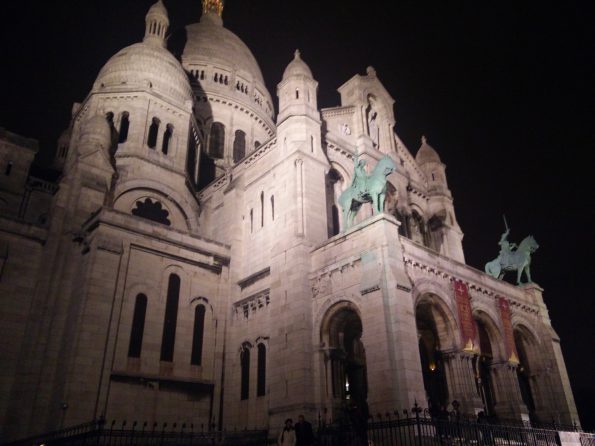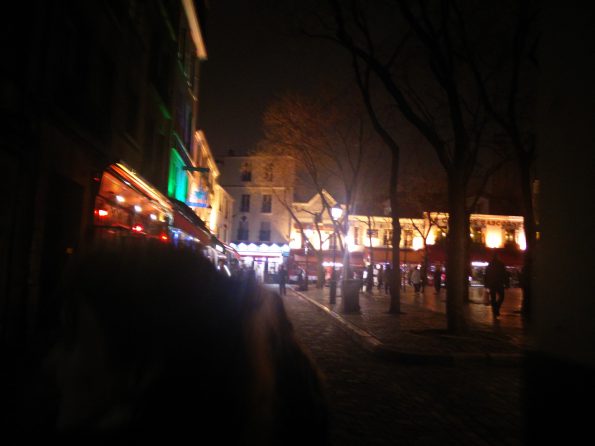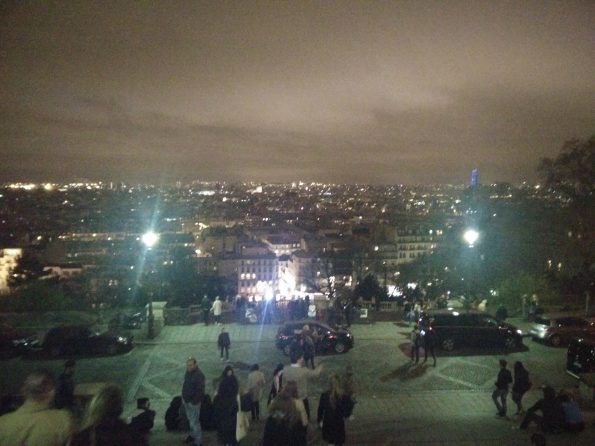
Sacré-Cœur at night
Photo by Anhar Karim
The Sacré-Cœur church in Paris is a majestic and awe-inspiring structure towering high into the sky. It is topped off with two statues of horsemen in full armor, raising their swords as if ready for battle. And on this night, Hamdi stood right in front of the church at Montmartre square, armed with only some light up toys and trinkets. And yet, he could not feel more at home.
Montmartre wears the Parisian night well. Here visitors, Parisian and tourist alike, happily saunter through the space, drinking beers and pulling in strangers for a leisurely dance or two. Some teenagers sing a rowdy song to the left and to the right a young couple stares out at the Parisian skyline. Here Hamdi stands with a small sack full of trinkets: Eiffel tower toys, light up keychains, some tacky hats— things one would buy to remember the moment, to latch a happy memory onto an object in order to recall that happiness again and again. But Hamdi does not need these trinkets he sells to his customers. The fact of his life in Paris is enough fuel to sustain his smile.

The festively lit square right beside the church
Photo by Anhar Karim
Hamdi is not his real name. He requested that his identity be kept a secret because he is not legally in France.
“I’m just trying to do business and send money back to my family,” he says, waving his one free hand energetically to summon customers his way. He says that he knew from a young age he liked doing business and that he was good at it. And so when the time came to go earn money for his family, he decided to put his skills to use. It’s the mind of a businessman that brought him to Paris. He comes to this spot of town many nights of the week, or to several other similar spots, and sells whatever he can to people. He admits that some see it as in poor taste to take advantage of tourists’ naiveté by selling them overpriced trinkets, but he insists that this doesn’t make him a bad person. There are the bad undocumented immigrants in the city who rob and injure. But he’s not doing anything like they are. He’s only trying to make an honest living so he can make some money for his family at home.
“If you go to Gare Nord, you’ll think that you’ve found Bangladesh here,” he says. The area just outside the Gare Nord train station is a portal to South Asia. The place is sprinkled with Indians, Pakistanis, and, yes, Bengalis. One need only walk into one of the many Bengali restaurants there, eat the traditional pani puri snack, and he may forget that Paris exists outside the doors.

The view from Montmartre square
Photo by Anhar Karim
But not everyone wants France to look like this. Hamdi talks about how the country now has its own Donald Trump candidate now under the name Marine Le Pen. And, Hamdi laments, it looks like she has a chance at winning the coming first round of the presidential election. He notes that she only has support because there is a lot of racism in the country. Many people, like Le Pen, cannot even look upon darker faces. “Racists,” as he calls them, wonder where he came from and wish that he would leave. Though, interestingly, Hamdi says that it’s not only the native French that bear this guilt. Arabs, though likely victims of discrimination themselves, will often discriminate against Bengalis and other dark skinned people they meet.
Despite all of these unsettling factors, Hamdi does not see Paris as an unwelcoming home. People have never outright asked him to go away or to go back to his country. No one has ever so directly called him out like that in the three years he’s lived here. He knows those negative sentiments hide under people’s surfaces, but he sees hope in the fact that people choose to conceal them. When asked if he sees himself as a French Bengali, he responds,
“I am living in France, and I am Bengali.” Hamdi has not found that the French identity is his, but nevertheless he can proudly say that he loves the new home he’s made of this city.
